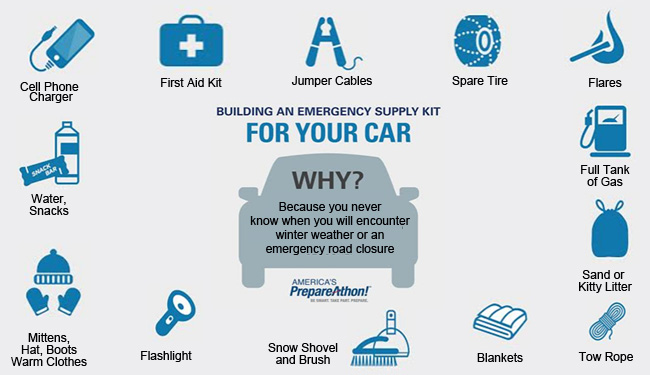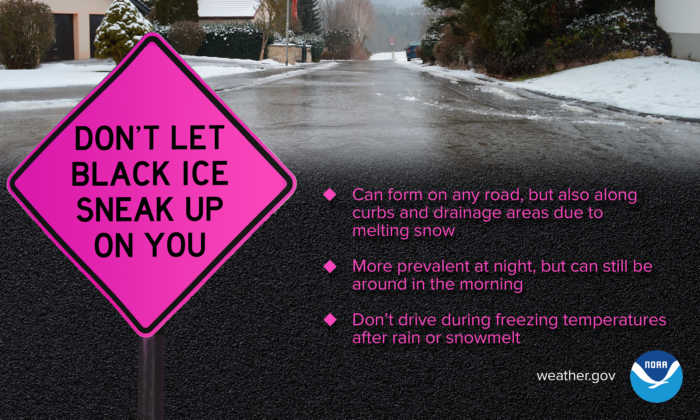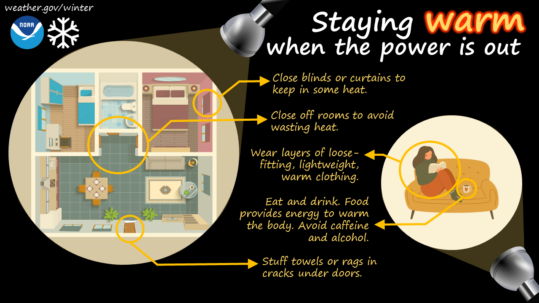Winter storms can bring snow, sleet, and freezing rain across the entire United States and its territories. Thousands of people are injured or killed every year in traffic accidents related to slippery roads from winter storms.
Prepare
Winter Weather Warnings
The National Weather Service issues Winter Weather-Related Warnings, Watches, and Advisories based on local criteria.
- Blizzard Warnings: Issued for frequent gusts ≥ 35 mph accompanied by falling/blowing snow, reducing visibility to less than 1/4 mile for three hours or more. Avoid travel. If you must travel, carry a winter survival kit. If stranded, stay with your vehicle.
- Winter Storm Warnings: Issued for significant winter weather (snow, ice, sleet, blowing snow). Travel may become difficult or impossible. Delay travel plans until conditions improve.
- Ice Storm Warnings: Issued for ice accumulation ≥ 1/4 inch, which makes travel dangerous/impossible, likely leading to snapped power lines and falling tree branches. Travel is strongly discouraged.
- Wind Chill Warnings: Issued for dangerously low wind chill values due to very cold air and strong winds. Frostbite and hypothermia are risks. Avoid going outdoors.
Make an Emergency Supply Kit
Prepare for the storm by creating an Emergency Supply Kit. Ensure all family members know where the kit is kept. Keep a kit of emergency supplies in your car in case you are stranded.
Items to include:
- Flashlights and Batteries
- Food and Water: Dried fruit, nuts, granola bars, and other food that does not require cooking or refrigeration.
- Medicines: Extra prescription and over-the-counter medicine. Baby items such as diapers and formula.
- First-Aid Supplies
- Heating Fuel: Fuel carriers may not reach you for days after a severe winter storm. Consider an emergency heating source such as a fireplace, wood stove, or space heater. Learn proper use to prevent fire, and ensure proper ventilation.
- Blankets and Sleeping Bags
- Shovel and Windshield Scraper/Brush
- Fire Extinguisher and Smoke Alarm: Test monthly.
- Pets: Extra pet food and warm shelter.

Other Things to Note:
- Ensure your carbon monoxide detector works correctly, and the outside vent is clear of debris and snow.
- Home Fires: Review ways to keep your home safe when staying warm.
- Generator Safety: Never run a generator in an enclosed space.
- Keep your gas tank near full to avoid ice in the tank and fuel lines.
- Learn more on Disaster Kits via weather.gov
Plan
What to Do During a Winter Storm
If You Are Outside:
- Find Shelter: Stay dry and cover exposed body parts. If no shelter is available, build a lean-to, windbreak, or snow cave. Build a fire for heat and to attract attention. Place rocks around the fire to absorb and reflect heat.
- Melt Snow for Drinking Water: Eating unmelted snow will lower your body temperature.
- Exercise: Move arms, legs, fingers, and toes periodically to keep warm.
If You Are In Your Car:
- Slow Down: Roads may be slick even if they appear just wet. Over 5,000 fatalities occur on roadways each year due to weather conditions.
- Clear Ice/Snow from Your Vehicle Before Driving: Flying ice and snow from cars can cause accidents.
- If Visibility Is Poor, Pull Over: Stop your car until visibility improves. Turn off your lights and use your parking brake when stopped to avoid being hit by another car.

Find out about road closures due to ice, snow, or storm damage due to downed trees or power lines at DriveNC.gov.
If You Are Inside:
- Stay Inside: Use fire safeguards and proper ventilation when heating with a fireplace, wood stove, or space heater. If you have a gas furnace, ensure it is not blocked by snow.
- If Your Heat Goes Out:
- Close off unneeded rooms.
- Stuff towels/rags in cracks under doors.
- Close blinds/curtains to retain heat.
- Eat and drink to produce body heat. Stay hydrated with non-caffeinated, non-alcoholic drinks.
- Wear layers of loose-fitting, warm clothing. Remove layers to avoid overheating.
- Follow local government channels for shelter information if staying in your home becomes too cold. Shelters may only offer refuge until a storm passes, so bring food and bedding.
- If Your Power Goes Out
- Make sure you have your power company’s phone number so you can call them if your power goes out during or after the storm.

Information
Resources
Who Has Reliable Information?
- Visit weather.gov for local hazards.
- Register for emergency alerts from your local government.
- Follow the National Weather Service on social media
- Subscribe to the National Weather Service for updates.
Winter Weather Resources:
- National Weather Service Winter Preparedness
- Ready.gov
- Interactive Snow Tracking
- County Emergency Management Agencies and Alerts
- Road Closures: DriveNC.gov
- Additional Information: View Red Cross Guides and FEMA guides.
- NC DOI Winter Preparedness
Update
Regularly review and update your winter storm preparedness plan, emergency kit, and resources to ensure readiness for the winter season.
